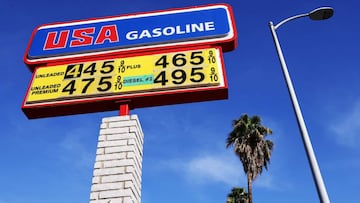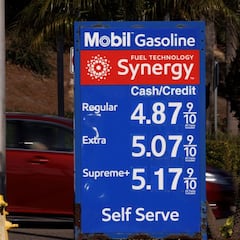Is inflation happening worldwide or only in the US?
Inflation is hitting record levels in the US, driven by both the pandemic recovery and an OPEC oil block, sending the price of gas through the roof.


Inflation measures how much more expensive a set of goods and services has become over a certain period. The most recent Consumer Price Index (CPI) inflation report showed that inflation has risen by 6.2% this year, the largest increase since 1990. Over the past month, it has seen an increase of over 0.9%. Substantial increases were to be seen in the indexes for energy, shelter, food and new and used vehicles. Significantly, the fuel index rose by 6.1% in October.
President Joe Biden said reversing the spike in inflation was a "top priority".
"Many people remain unsettled about the economy and we all know why. They see higher prices. They go to the store ... or online and they can't find what they always want and when they want it. And we're tracking these issues and trying to figure out how to tackle them head on."
But the high US inflation rate is not a local anomaly. The world leaving the covid-19 pandemic is causing innumerable problems for economies everywhere, as well as a squeeze on oil prices by those who the US calls an ally.
Related news:
- Why is inflation in the US so high?
- COLA 2022: can social security payments be affected by inflation in the US?
- Will a new stimulus check happen in November 2021?
- Why is the US Federal Reserve ending covid-19 stimulus checks?
What is behind the high inflation levels?
US inflation can be partly put down to the large government spending in the last two years which has seen trillions be spent on some of the widest ranging welfare the US has ever seen. Three stimulus checks have kept millions afloat, while extra support for businesses has been very welcome. But there are also global factors which are leading to high inflation in many parts of the world, not just the US.
A major factor of this is the price of oil and gas. In over a year, the price has increased by more than a dollar a gallon, now standing at around $3.40, a seven-year-high. Alluded to by President Biden, the oil group OPEC is strangling prices, perhaps to make a political point.
Ali Shihabi, a Saudi national who is considered a voice for Crown Prince Mohamed bin Salman in Washington, wrote in a statement to The Intercept, “The Kingdom resents being blamed for what is essentially a structural problem not of its own making in the US which has hampered its own energy production... I hear that the price of Thanksgiving Turkeys has doubled in the US so why can oil prices also not inflate?” Shihabi added a winking emoji to the end of his comment.
Biden has the phone number of who he will have to call if he wants any favours: @CroftHelima "OPEC will come under increasingly intense pressure from Washington to open the production release valve and cap the upside” https://t.co/d09aml1JcT via @markets
— Ali Shihabi علي الشهابي (@aliShihabi) October 2, 2021
The American economy is heavily dependent on fossil fuels, and on top of the prices consumers pay directly at the pump and for energy at home, the costs of food and manufactured goods are also heavily susceptible to swings in energy prices. It is all tied into transportation of goods, another issue which has left ships unable to dock as countries struggle with new demand after the pandemic.
It has been supposed that the Saudis are unhappy at no longer being given a blank check by the US government. President Trump was a keen ally of the Saudis, made his first foreign visit as president to the Gulf state in 2017. However, the Saudi state murder of Saudi journalist Jamal Khashoggi has rightly become a sticking point in differences between the US and its ally. President Biden has taken a different view, becoming more critical of Saudi Arabia, while demonstrating the dilemma of an unwieldy ally with continued arms shipments, to be used in the war in Yemen.
Russia says there is no shortage of oil in the global market, adding to OPEC+ members pushing back against U.S. calls to raise output faster https://t.co/UuLANGiXAs
— Bloomberg Economics (@economics) November 15, 2021
Related stories
"Gas prices relate to a foreign policy initiative that is about something that goes beyond the cost of gas,” Biden said at the town hall last month. "The supply [is] being withheld by OPEC. And so there’s a lot of negotiation that is, there’s a lot of Middle Eastern folks who want to talk to me. I’m not sure I’m going to talk to them. But the point is, it’s about gas production.”
Unlike Trump, Biden is pushing back against the Saudis, even if he is still selling weapons. It will take more than a weapons bribe to pressure the Saudis to let the oil flow, however.
